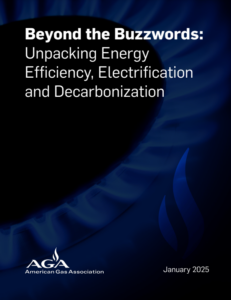Beyond the Buzzwords: Unpacking Energy Efficiency, Electrification and Decarbonization
In the past decade, efforts to mitigate climate change have intensified, focusing on the need to reduce greenhouse gas emissions across every sector of the economy. Achieving meaningful progress will require an all-of-the-above energy strategy that focuses on maintaining safe, reliable and affordable energy for all consumers while advancing innovation that incorporates lower-carbon solutions at scale.
These efforts have led to a prevailing but inaccurate assumption that electrification—shifting from fossil fuel use to electricity for residential, commercial, industrial and transportation applications—equates to decarbonization and, by extension, contributes to climate change mitigation. This false belief rests on the notion that converting fossil-fuel based energy loads and appliances to electricity will significantly reduce greenhouse gas emissions as the electrical grid incorporates more renewable sources. Consequently, terms like “electrification,” “decarbonization” and even “energy efficiency” (or energy conservation) have become interchangeable in policy discussions.
While the concepts of “electrification,” “decarbonization” and “energy efficiency” may be interconnected, they are not synonymous and have conflicting and contradictory meanings. Each represents a distinct goal, which may not be aligned. For example, in many locations in the United States, the use of electric applications as a substitute for other fuels may result in higher emissions or require greater energy use. Therefore, “electrification” as a policy objective would conflict with decarbonization or energy efficiency goals. Overlooking these distinctions can lead to policies that focus solely on advancing electrification without adequately considering emissions reductions or energy efficiency improvements.
This paper examines the distinct roles of energy efficiency, electrification and decarbonization in pursuing climate goals and challenges the assumption that electrification alone ensures emissions reductions. By disentangling these concepts, a wider array of policy solutions aimed at sensible emissions reductions can be explored. In this context, a holistic approach to emissions reduction that combines the direct use of natural gas, integration of renewable sources and implementation of efficient technologies emerges as the most effective way to reduce greenhouse gases while maintaining safe, reliable, resilient and affordable energy service choices for consumers.
Key Terms:
Decarbonization is the process of reducing greenhouse gas emissions across energy end-uses or sectors of the economy.
Electrification refers to the replacement of direct fuel use with electric end-uses.
Energy efficiency refers to using less energy to perform the same task or produce the same outcome.
Read the full report below:

